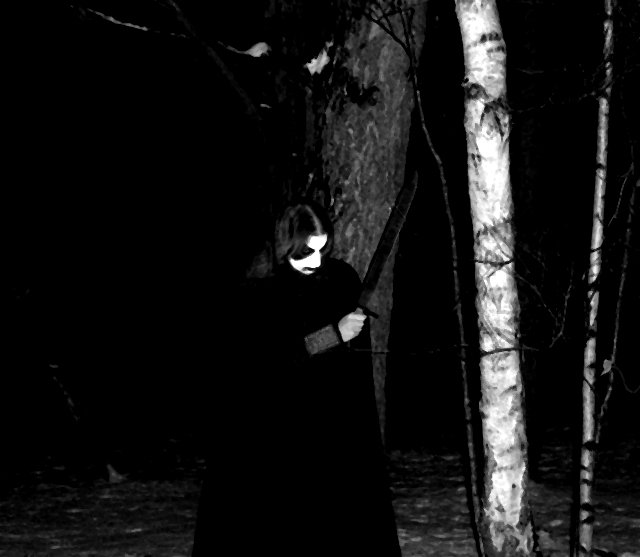Evilfeast: The Frozen Majesty of Atmospheric Black Metal
Explore the haunting legacy of Poland’s Evilfeast, GrimSpirit’s atmospheric black metal project where frost, solitude, and cosmic sorrow become sound.
In the sprawling world of atmospheric Black Metal, few projects are as enigmatic or evocative as Poland’s Evilfeast. Conceived in solitude by the elusive GrimSpirit, Evilfeast bridges the haunted echoes of ancient forests with the boundless cold of cosmic infinity. This essay dives deep into the soul of Evilfeast, from its lo-fi roots to its celestial ascension, not as a review, but as a reflection. This is Black Metal as myth, as memory, as mourning.
Frost Upon the Firmament: The Solitude and Majesty of Evilfeast
There are Black Metal projects that revel in chaos, that burn with fury or scream into voids of politics, ideology, or hatred. But Evilfeast is different. Evilfeast does not rage, it laments. It does not preach, it wanders. It does not seek destruction, but transcendence through the cold and the cosmic. Founded in Poland by a solitary soul known only as GrimSpirit, Evilfeast emerged at the dawn of the 21st century as both a continuation of the atmospheric Black Metal tradition and a secret pilgrimage into deeper mysteries. Where many Black Metal bands perform darkness as theatre, Evilfeast makes it ritual, not for show, but for shelter. It is the sound of a man alone with the stars, wrapped in frost, gazing beyond mortal things.
I. The Forest Temple: “Mysteries of the Nocturnal Forest”
In 2004, Evilfeast released its first full-length incantation: Mysteries of the Nocturnal Forest. Raw, monochromatic, and stretched across sprawling song lengths, this record feels like the interior of a midnight cathedral carved into frozen bark and mist. It is far from accessible, its production is thin, its melodies buried, its vocals distant howls from behind a wall of winter. And yet it aches with beauty. What Evilfeast understands, even from the beginning, is that atmosphere is not simply about reverb or keyboards, it’s about devotion to space. The forest here is not a setting, it is the protagonist. Songs like “Celestial Whispering” and “My Tower Among the Stars” emerge not from ego or performance, but from submission to vastness, a bowing of the human form before eternal frost. This is lo-fi music not as a limitation, but as a gesture of humility. To polish the sound would be to lie. The cracks in the tape are part of the shrine.
II. The Forgotten Horizon: “Funeral Sorcery” & “Lost Horizons of Wisdom”
With 2005’s “Funeral Sorcery”, Evilfeast began to deepen its rituals, injecting a stronger sense of melodic necromancy into the fog. Still cavernous and bleak, the record introduces more confident guitar lines and keys that pierce like shafts of moonlight through dying trees. But it is 2007’s “Lost Horizons of Wisdom” where Evilfeast ascends. Here, GrimSpirit is no longer just a ghost in the woods, he is a monk of the void, a stargazer kneeling in snow. The melodies are sweeping, medieval, and deeply sorrowful. There are passages that echo with Burzum’s trance, others that hint at Darkspace’s astral detachment, but always filtered through a distinctly Slavic melancholy, a sadness that comes from knowing too much silence. The guitars swirl like wind. The synths are mournful choirs. The songs stretch to ten, twelve, even fifteen minutes, not because they are excessive, but because time ceases to matter in such places. This is not entertainment. This is invocation.
III. The Stellar Wind: “Elegies of the Stellar Wind”
In 2017, ten years after his last full-length, GrimSpirit released his most acclaimed work: “Elegies of the Stellar Wind”. The production was cleaner, the layers more finely etched, but the soul of Evilfeast remained intact: haunted, frostbitten, infinite. What sets “Elegies…” apart is not that it abandons the lo-fi aesthetic, but that it finally reveals what was always buried beneath it: genuine compositional brilliance. The opening track, “The Second Baptism... Shores in Flames,” is not merely Black Metal, it is a symphony of ruins. Choral synths, martial drums, melodies like frostbite spreading through veins, the album balances between grandeur and decay. Evilfeast, by this point, is no longer a secret. It is a monument, not in the mainstream, but in the hearts of those who wander the same silent paths. In a world of overexposure, GrimSpirit remains defiantly unseen, speaking only through sound.
IV. Beyond the Veil: Legacy and Silence
What makes Evilfeast endure is
not simply its music, but its ethic of distance. In an era where artists brand
themselves endlessly, GrimSpirit remains a myth. There are no concerts. No
interviews. No apologies. Evilfeast exists as a relic of what Black Metal was
supposed to be: not performance, but practice. And yet, this retreat from the
world does not feel like cowardice, it feels like faith. Faith in sound. In
solitude. In the sacred act of creating without spectacle. Evilfeast is the
forest that never asks for your name. It is the snow that does not care if you
watch it fall. Evilfeast does not need promotion. It does not beg for followers
or reissues or reassessments. It simply exists, like frost on ancient stone.
This essay is not an attempt to explain it, but to stand in its presence, humbled,
quiet, listening. In an age of overexposure, Evilfeast reminds us of the power
of the unseen, the unspoken, the still-beating heart beneath centuries of snow.


Comentários
Enviar um comentário